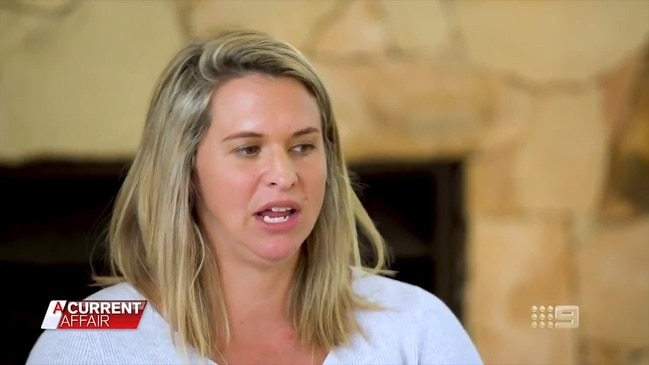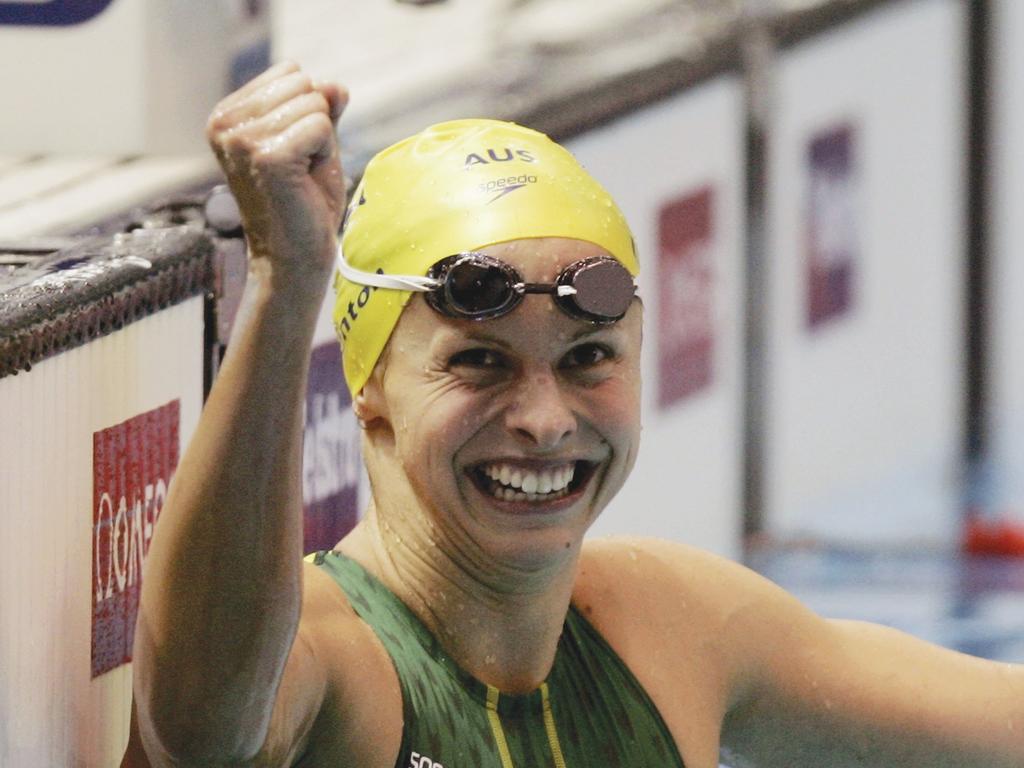Former swimming champ Libby Trickett opens up on post-natal depression
Former Australian swimming champion Libby Trickett has broken down on TV after a stunning and heartbreaking admission.

Australian golden girl Libby Trickett has revealed her painful battle with post-natal depression and the toll it took on her and her family.
The former 100m and 50m world record holder, won a bag of Olympic medals, with four gold, a silver and three bronze across three games.
Plenty of World Championship and Commonwealth Games success will see the star remembered as one of Australia’s greats in the pool.
But Trickett, now six years into retirement, has shared her pain after suffering post-natal depression with her first child Poppy on Channel 9’s A Current Affair.
Trickett, who is set to release her memoir Beneath The Surface, shed tears while talking about her relationship with her now four-year-old daughter.
“She’s such a beautiful little girl,” Trickett said. “I think when you go through post-natal depression and you do feel such guilt for missing that time, you feel like you’ve missed out on her somehow. But she does not make me feel like I’ve missed out on her at all and she tells me she loves me every day and that is incredibly healing.”
But 34-year-old swimming star didn’t hold back when discussing her history with depression after the birth of Poppy.
“Around four months, she decided that sleep was just not for her at all,” she said. “And the progression of the extreme sleep deprivation that she put everyone through just spiralled my mental health and my mental illness to a point that I became scared of me.
“I couldn’t imagine being an eight-month old baby and being screamed at.”
Trickett recalled one instance where she was on the way to the gym and it was the moment she realised she needed help.
“I had very dark thoughts, we don’t often go into those dark thoughts but I thought of harming Poppy, I didn’t want to be here,” Trickett said. “I had no idea that depression could look like anger and that was my main symptom during PND. I was so angry and it was almost like I had a mental break and I just had this moment where I completely lost it at Poppy, I was screaming at her.
“She just started bawling her eyes out, and I just completely lost it at her, for 25 minutes I was screaming at the top of my lungs.
“I just remember getting there and realising I need help. This is not someone who is of sound mind, I’m scared. As much as I’m loved and supported and knew I wouldn’t hurt her, it was too close to want to keep progressing down that path.”
Libby Trickett was Australia’s golden girl but behind that trademark smile she has harbored a very private struggle. #9ACA pic.twitter.com/sP8xTz27M2
— A Current Affair (@ACurrentAffair9) September 26, 2019
Trickett said she hoped her book could help other women to realise that although they may not get post-natal depression, but it’s important to understand the symptoms and warning signs.
During her career in the pool, Trickett admitted she was tough on herself despite her love for competing and representing Australia.
Even during that time, she said she had a low opinion of herself, with the 100m freestyle final at the Beijing Olympics in 2008 a tough time.
Trickett was the World record holder at the time and despite scraping into the final, was eager to take home the gold.
But she finished second behind Germany’s Britta Steffen, who claimed the Olympic record.
In fact, Trickett also finished inside the previous Olympic record, just 0.04 seconds outside the gold medal.
Trickett admitted that she still hadn’t seen the race.
“I was just so disappointed with how I executed the race,” she said.
“That 100 freestyle was my most poorly executed race. I haven’t even watched it.”

Trickett said she was incredibly tough on herself and had huge expectations on her career.
Trickett also revealed a failed drug test, although the story didn’t reveal which Commonwealth Games it was at.
“During the Commonwealth Games, I was drug tested every day,” she said. “I was notified that the testosterone levels in my sample were too high, which hit me so hard. Essentially they were accusing me of cheating, and that was something that hurt me to my core.
“Thankfully we were able to go back and prove that my testosterone has been at the same level since I very first got tested when I was 15.”
If you need help with depression, please see Beyond Blue for a list of organisations that can help. If you or someone you know needs help, please contact Lifeline on 13 11 14.




